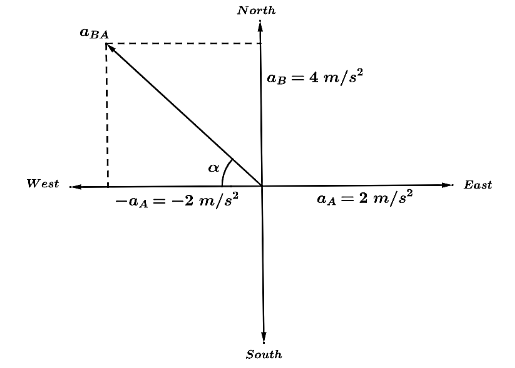Question
Question: Car \(A\) has an acceleration \(2\,m{s^{ - 2}}\) due east and car \(B\) has acceleration \(4m{s^{ - ...
Car A has an acceleration 2ms−2 due east and car B has acceleration 4ms−2 due north. What is the acceleration of car B with respect to car A ?
Solution
We can find the acceleration of the car B with respect to car A by using the concept of motion in two dimensions in which two objects are moving along two different directions with different speeds. We use the concept of resultant acceleration of both the motions and find the magnitude and direction of the resultant acceleration.
Complete step by step answer:
Let us assign some terminologies to the given data for better understanding.
aˉA - acceleration of car A.
aˉB - acceleration of car B.
aˉBA - acceleration of car B with respect to car A.
Car A is travelling in the east direction with acceleration 2ms−2 while Car B is travelling in the North direction with acceleration 4ms−2 .So,
∣aˉA∣=2ms−2 and ∣aˉB∣=4ms−2
Let us draw the given situation.

The acceleration of car B with respect to car A is given by
aˉBA=aˉB−aˉA=aˉB+(−aˉA)
The magnitude of the acceleration of car B with respect to car A is given by
∣aˉBA∣=∣aˉB∣2+∣aˉA∣2=42+22
∴∣aˉBA∣=25ms−2
Hence, the direction of the acceleration of car B with respect to car A is North-west given by angle α.
Note: The direction of the resultant acceleration changes when we are asked to find the acceleration of car A with respect to car B . The direction of resultant acceleration is given by α=tan−1(aAaB) . The acceleration of the car A with respect to car B is just opposite that in direction but of the same magnitude.
